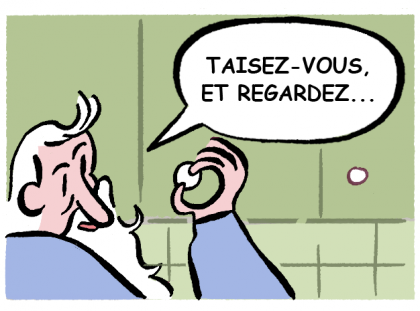Combining pronouns with verbs in the imperative in French
Read more about how to use Combining pronouns with verbs in the imperative in French.
Feel the need to learn new grammar tips fast? Learn French online and test your grammar knowledge with Frantastique for free.
Combining pronouns with verbs in the imperative
• In affirmative phrases, pronouns (nous, vous, toi, etc.) are placed after the verb, separated by a hyphen (-).
| Present (indicatif) | Imperative (present) |
|---|---|
| Tu te lèves You get up Nous nous levons We get up Vous vous levez You get up | Lève-toi ! Get up! Levons-nous ! Let's get up! Levez-vous ! Get (yourself/yourselves) up! |
• In negative phrases, the reflexive pronoun is placed before the verb.
| Affirmative form | Negative form |
|---|---|
| Lève-toi ! Get up! Levons-nous ! Let's get up! Levez-vous ! Get (yourself/yourselves) up! | Ne te lève pas ! Don't get up! Ne nous levons pas ! Let's not get up! Ne vous levez pas ! Don't get up! |
Victor, lave-toi, coiffe-toi mais ne te rase pas. Victor, wash yourself, do your hair, but don't shave.
Embrassons-nous, aimons-nous mais ne nous marions jamais ! Let's embrace, let's love each other, but let's never get married!

Still having trouble with 'Combining pronouns with verbs in the imperative'? Master the rules of French grammar and improve your French level thanks to our online French lessons Frantastique. We're offering a 7-day free trial, so what are you waiting for?
What our users say:
Looking to improve French for beginners? Frantastique provides effective and fun training!
Tips for learning 'Combining pronouns with verbs in the imperative'? Share them with us!
